Key takeaways:
- The UK news media landscape is diverse, reflecting societal values and biases, particularly during major events like Brexit.
- Approaching controversial topics requires sensitivity, honesty, and understanding the emotional weight behind differing perspectives.
- Fact-checking tools, including Snopes and Google Scholar, are essential for navigating misinformation and enhancing discussions.
- Personal anecdotes and active listening can bridge ideological divides and foster more meaningful conversations on complex issues.

Understanding UK news media
The UK news media landscape is incredibly diverse, with a mix of traditional newspapers, broadcast channels, and online platforms. I remember the first time I realized the complexity of this system; I was just starting my career in journalism. It struck me how each outlet offers its unique perspective, shaping public discourse in ways that often reflect their own biases or values.
One thing that has always fascinated me is how the UK’s media is often a reflection of its society. For instance, during major events like Brexit, different media outlets seemed to resonate with various segments of the population, reinforcing or challenging prevailing narratives. Sometimes I wonder, how much do we let our trusted sources dictate our views? This realization made me more critical of my own media consumption habits.
I also find the ethical considerations surrounding UK news quite compelling. In a world where sensationalism can overshadow factual reporting, the responsibility of news outlets to maintain integrity and objectivity is paramount. I often reflect on the importance of scrutinizing sources and seeking out balanced coverage. How can we, as consumers, navigate this media maze without compromising our understanding of critical issues?
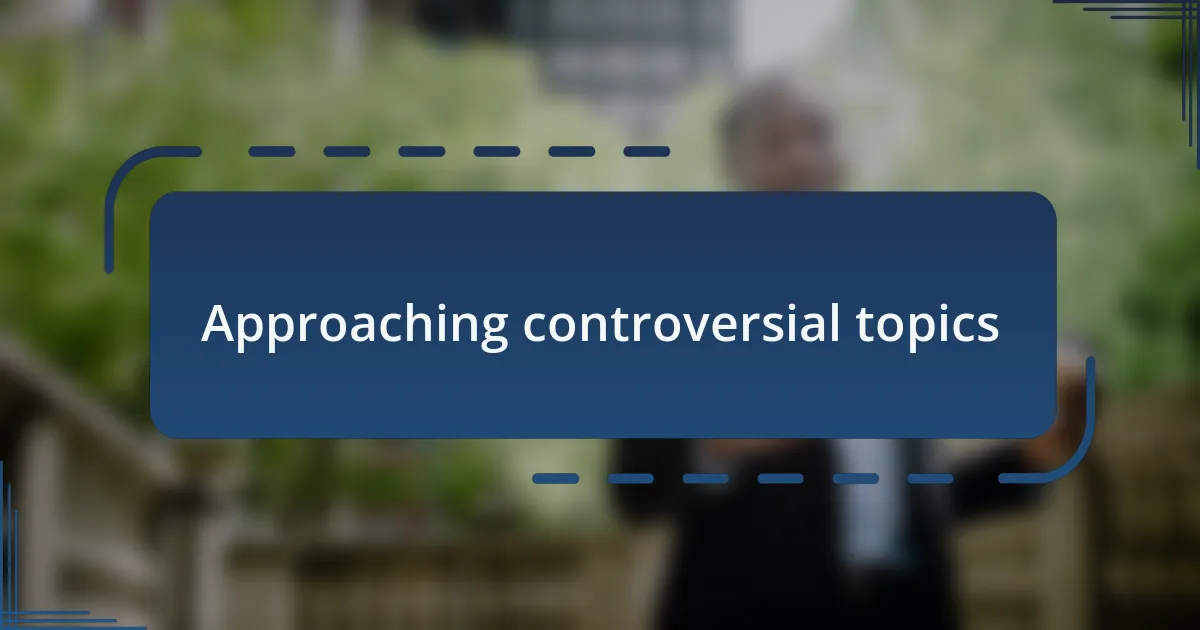
Approaching controversial topics
Approaching controversial topics requires a careful balance of sensitivity and honesty. I vividly recall a particular debate on immigration during my early reporting days, where each word felt like walking a tightrope. The experience taught me that framing is everything; the way questions are posed can either alienate or engage listeners.
In another instance, I was tasked with covering a protest regarding climate change policies. As I immersed myself in the event, I felt the palpable tension in the air, driven by deeply held beliefs. It confirmed for me the necessity of understanding the emotional weight behind controversial issues. How do we accurately represent conflicting viewpoints while remaining respectful? This question continues to influence my approach.
I’ve learned that context is vital when discussing contentious subjects. I remember patiently interviewing individuals with different perspectives on gun control, aiming to capture their stories without bias. It underscored the idea that even in disagreement, there can be valuable lessons. In the turbulent landscape of political discourse, how can we foster dialogue rather than division? It’s an ongoing challenge that I strive to navigate with each article I write.
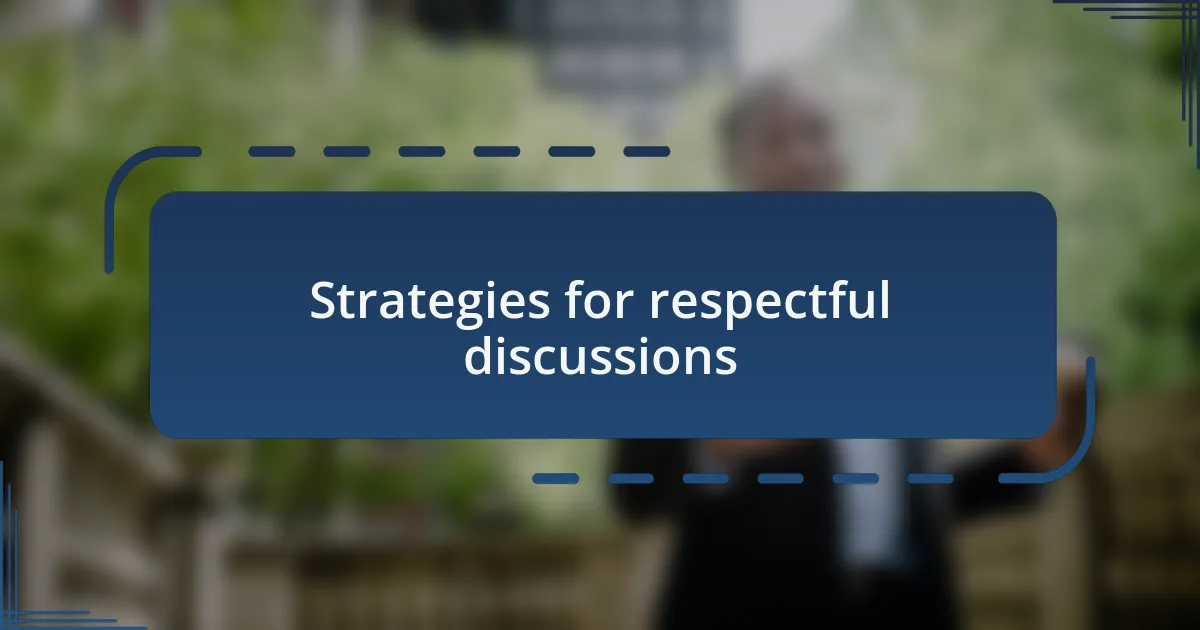
Strategies for respectful discussions
When engaging in discussions about controversial topics, I find that actively listening is one of the most effective strategies. One memorable conversation I had was with a colleague who held opposing views on taxation. Instead of immediately countering his beliefs, I took the time to understand his perspective and shared my own experiences. This not only defused potential tension but also allowed us to clarify misconceptions and build a more respectful exchange.
Another approach that has served me well is finding common ground. I remember a heated discussion about the influence of social media on political beliefs. By focusing on our shared concern for the impact of misinformation, we moved away from hostility and began to explore solutions together. It’s fascinating how a simple shift in focus can transform a challenging conversation into a constructive dialogue, isn’t it?
Lastly, I’ve learned the value of maintaining a calm demeanor. During a panel discussion on healthcare reform, I noticed that when one participant raised their voice, it triggered defensive reactions. I made an effort to stay composed and address the points made with care. This choice not only helped maintain respect but also encouraged others to follow suit. After all, isn’t it crucial that we model the kind of discourse we wish to see in society?
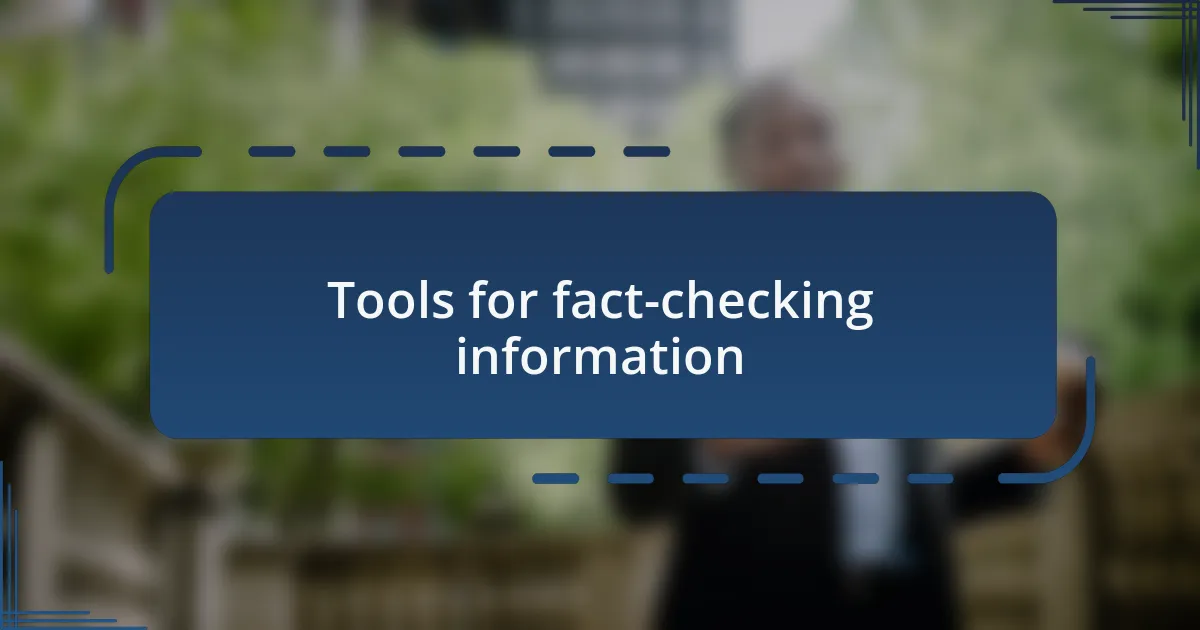
Tools for fact-checking information
When it comes to fact-checking, I often turn to established organizations like Snopes and FactCheck.org. In one instance, I encountered a viral meme about a political event that sparked intense debate among my friends. Instead of joining the fray, I quickly searched for the meme on Snopes and shared the findings. Not only did it clarify the misinformation, but it helped steer the conversation in a more constructive direction.
Another tool I find invaluable is Google Scholar. I remember once debating economic policies that were heavily influenced by various studies. Instead of relying solely on popular opinion, I dived into academic research articles that offered evidence-based insights. This approach not only enriched my understanding but also elevated the discussion, prompting others to reconsider their viewpoints. How often do we stop to think that data can shift our perspective when confronting sensitive topics?
Moreover, I’ve discovered the power of social media verification tools like Twitter’s verification process. I recall a time when a widely circulated tweet misquoted a prominent politician. By using Twitter’s features to check the source before reacting, I was able to debunk the misinformation before it spread further. It made me realize how essential it is to pause and verify, especially in the fast-paced digital landscape. Isn’t it crucial for us, as responsible participants in political discourse, to ensure that our facts stand on solid ground?
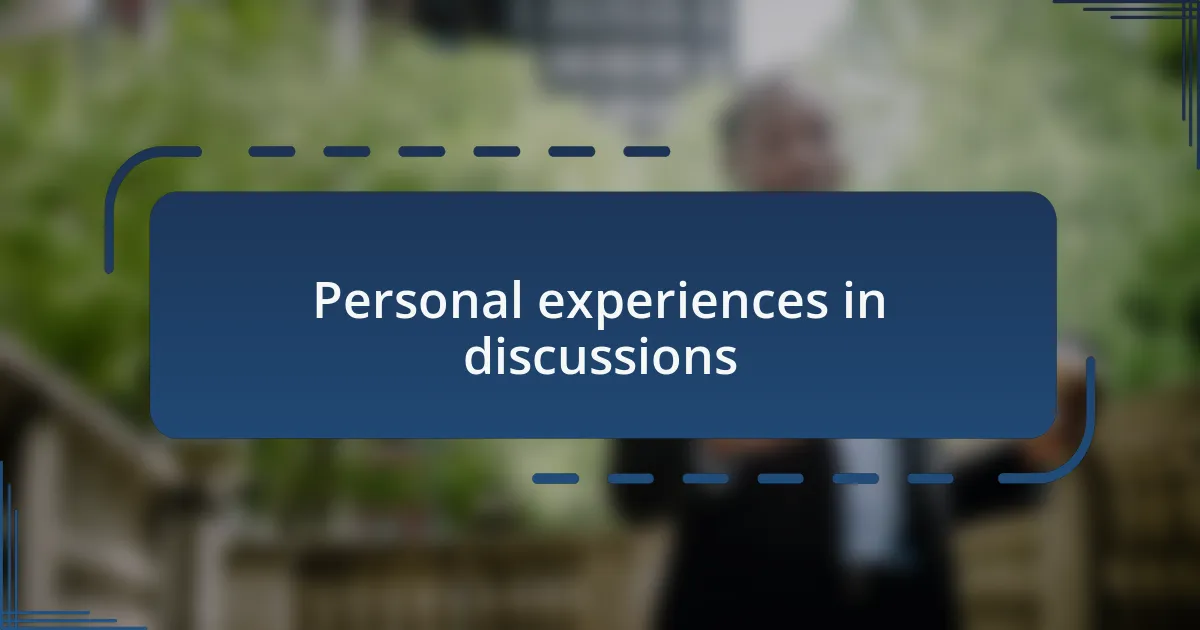
Personal experiences in discussions
I vividly remember a heated discussion about immigration policy at a family gathering. As opinions flew around the table, I felt the tension rise. Instead of jumping in with my own perspective, I asked my relatives about their personal experiences with immigrants. This simple shift in questioning transformed the shared narrative, allowing everyone to reflect on real stories rather than abstract statistics. Isn’t it amazing how personal stories can humanize complex issues?
In another setting, I found myself in a debate about climate change at a friend’s party. People had strong feelings, and the atmosphere was charged. Rather than anchoring my argument in scientific jargon, I shared my own journey of reducing plastic waste and how that choice affected my daily life. This relatable approach not only made my points resonate more but also encouraged others to share their own experiences. It’s funny how personal anecdotes can sometimes bridge ideological divides and spark genuine understanding.
Sometimes, though, discussions don’t go as smoothly. I recall a time when a colleague and I clashed over healthcare reform. I felt frustrated and defensive, worried that my viewpoint would be dismissed. However, taking a moment to breathe helped me respond rather than react. I decided to share an emotional story about a family member’s struggle with accessing healthcare. That openness shifted the tone of the conversation dramatically, reminding both of us that beneath our differing opinions were shared human experiences. How often do we let our emotions guide us toward more meaningful discussions?
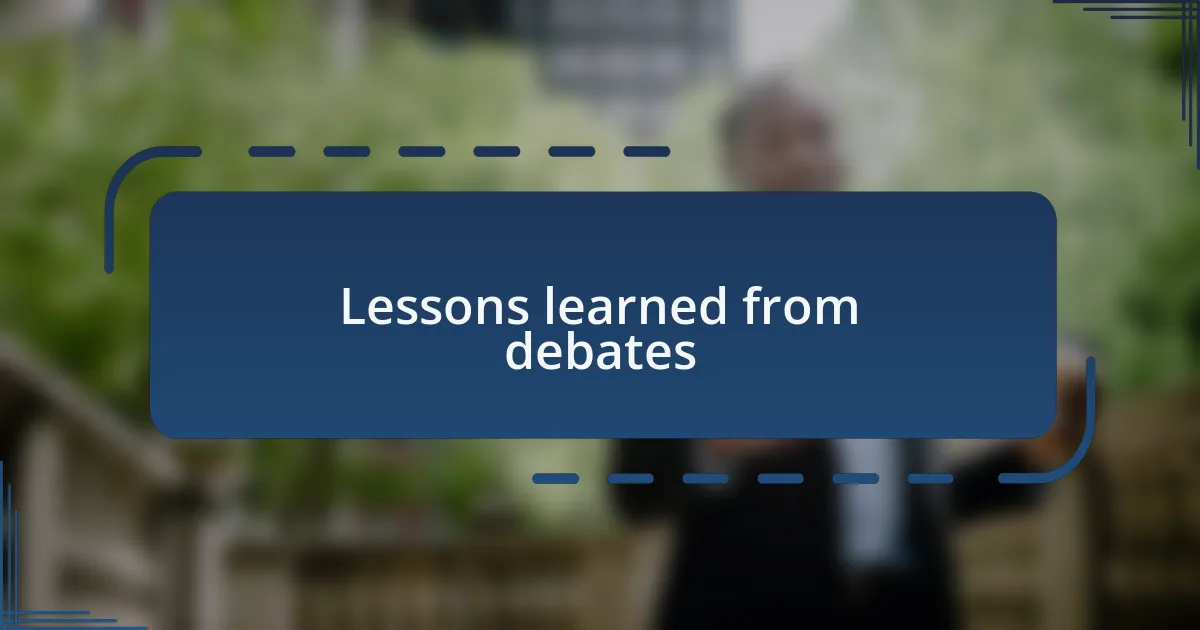
Lessons learned from debates
Engaging in debates often reveals the power of perspective. I once attended a town hall meeting where residents were divided on housing development projects. Instead of solely defending my stance, I listened intently to a couple who feared losing their neighborhood’s charm. Their emotional connection to the area opened my eyes to aspects I had overlooked, highlighting how acknowledging emotions can enrich our understanding of different viewpoints.
Throughout my experiences, I’ve learned that debates aren’t just about winning arguments; they’re about connecting with others. During a discussion about educational policies, I was struck by a single mother who spoke passionately about her child’s struggles in the current system. Her vulnerability reminded me of the real stakes behind policy discussions—individual lives affected by our decisions. Doesn’t it make you pause and think about the stories that lay behind every policy debate?
I also discovered the importance of patience in conversations. In one instance, I found myself in a heated exchange regarding social media regulations. The dialogue quickly became frantic, with each of us talking over one another. Stepping back, I suggested we each take a moment to express what we valued most about free speech. That single shift allowed us to chart a more constructive discussion moving forward. Isn’t it fascinating how a bit of patience can lay the groundwork for mutual understanding?